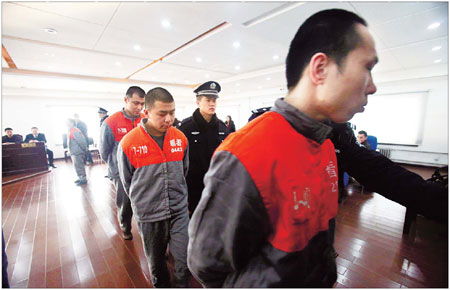Top News
New law targets organ traders
Updated: 2011-02-28 07:43
By Li Li (China Daily)
Ma Yanqing, 37, is getting used to a new heartbeat. The Guangdong migrant worker had a transplant in January, two months after he was taken to Tongji Hospital in Wuhan, capital of Hubei province.
"We are lucky," said Yin Huamei, Ma's wife. "I heard people waited for years."
According to the Ministry of Health, about 1.5 million people in China need organ transplants every year, but only around 10,000 operations are performed, due to a shortage of donated organs. The huge gap has led to the emergence of an illegal organ trade.
"The scarcity of available human organs is a global phenomenon," said Deng Liqiang, legal affairs department director at the Chinese Medical Doctor Association.
"It is just more obvious in China because of the number of illegal organ trades due to poverty."
To crack down on human organ trafficking, the National People's Congress Standing Committee, the country's highest legislative body, passed an amendment on Friday to the current criminal law that adds organ trafficking as a specific crime. Previously, traffickers were usually charged with operating an illegal business. The amendment also says that criminals convicted of "forced organ removal, forced organ donation or organ removal from juveniles" could face punishment for homicide, including the death penalty. The amendment will take effect on May 1.
The gap
"I have seen people wait for three to five years for the right organ," said Professor Chen Shi, deputy director of the Organ Transplant Research Institute at Tongji Hospital.
In 2007, the State Council issued the Regulation on Human Organ Transplantation and banned organ trafficking as well as organ donations to people who were not relatives. The black market continued, fueled by the need for money by the poor and the demand for organs by the rich.
Many people risk their lives to sell their organs. Some work as intermediaries, matching donors and people in need of transplants and providing forged identity documents.
In Beijing Chaoyang District People's Court on Feb 15, four people admitted their involvement in an organ trafficking ring that brought in 118 million yuan ($17.9 million). According to news reports of the trial, ringleader He Linxuan, 26, from Zhejiang province, recruited "donors" and traded organs for nine transplant operations in 2008 and 2009.
Ye Weihua, Zhen Dingliang and Si Zhenqiao, all from poor families, told the court they had "learned from the Internet" that they could make money by selling their own kidneys, and they contacted He. Each received 40,000 to 50,000 yuan after selling one kidney. Lured by large profits, they joined He in this illegal trade.
The men were charged with illegal business operation and pleaded guilty. The court hasn't announced their sentences.
Four similar cases were also tried in Beijing recently. Among all five, most of the organ traffickers were from remote or underdeveloped areas, and most had sold one of their kidneys.
"Trading human organs makes organ transplant only serve the rich," said Deng, the Doctor Association's lawyer. "The phenomenon intensifies the inequality of the society."
Specials

Kremlin buddies
Dmitry Medvedev and Vladimir Putin inspect Olympic preparations.

Lantern Festival
The Lantern Festival is celebrated across China.

New York Fashion Week
Models line up before a show during New York Fashion Week.
